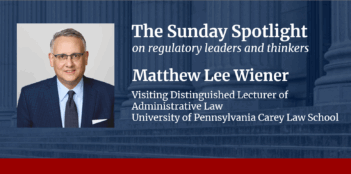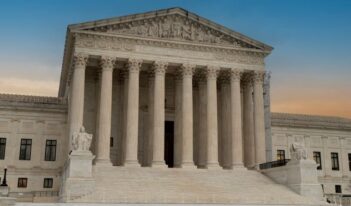
The Regulatory Review highlights the top essays written by our contributors in 2021.
The Regulatory Review is pleased to highlight our top regulatory essays of 2021 authored by a select number of our many expert contributors. These pieces, which qualify for this list based on the number of page views during the past 12 months, are arranged below in alphabetical order by last name of author.
Factoring Equity into Benefit-Cost Analysis
April 26, 2021 | Matthew D. Adler, Duke University School of Law
Distributional weighting shows how benefit-cost analysis can be improved.
Climate Change and Price Stability Mandates at Central Banks
September 13, 2021 | Sandra Ahmadi and Aseem Prakash, University of Washington
Climate-related risks pose financial stability concerns for the Federal Reserve and European Central Bank.
The U.S. Digital Identity Crisis
April 29, 2021 | Usmad Ahmed and Daniel Gorfine, Georgetown University, and Ivy K. Lau, Paypal Inc.
A national digital identity framework is key to unlocking equitable financial technology.
A New Digital Age Privacy Protection Agency Holds Promise
August 9, 2021 | Anita L. Allen, University of Pennsylvania
The Data Protection Act of 2021 would strengthen public safeguards over big data.
Supreme Court Reinstates Barriers to Abortion by Telemedicine
March 15, 2021 | Carrie N. Baker, Smith College
The Court requires in-person visits for patients seeking medication abortion despite the risks of COVID-19.
Financial Regulation for the Digital Age
May 6, 2021 | Jo Ann Barefoot, Alliance for Innovative Regulation
Financial regulators must adopt new strategies to keep up with changing technology.
Taking Trust in Government Seriously
January 25, 2021 | Maria De Benedetto, Roma Tre University, Nicola Lupo, LUISS University, Rome, and Nicoletta Rangone, LUMSA University, Rome
Regulators should adopt trust-enhancing methods to implement regulations and secure compliance—especially during a pandemic.
Federal Court Involvement in Supervised Release
June 28, 2021 | Richard M. Berman, Judge for the Southern District of New York
Study indicates a vital judicial role in overseeing defendants’ reentry following prison.
The Urgent Need for Indoor Air Quality Regulation
April 5, 2021 | Florentin Blanc, Organization for Economic Cooperation and Development
New scientific research and the COVID-19 pandemic should trigger a paradigm shift in indoor air quality regulation.
To End Science Denial, Admit That Policymaking Is Not All Science
June 14, 2021 | Tim Brennan, University of Maryland
Failing to recognize the importance of value judgments in policymaking encourages anti-science attitudes.
The Irrationality of Market Failure Theory
March 9, 2021 | James Broughel, Mercatus Center
The economic principles underlying cost-benefit analysis exclude future impacts.
Individual Liberty, Public Health, and the Battle for the Nation’s Soul
June 7, 2021 | Scott Burris, Temple University
Contrary to longstanding precedent, individualism reigns supreme in recent legal decisions over COVID-19.
Assessing Stigler’s Economic Theory of Regulation
August 23, 2021 | Cary Coglianese, University of Pennsylvania Law School
Despite its flaws and limitations, Stigler’s seminal article on the theory of economic regulation offers important lessons.
What Is the Future of Social Media Regulation?
July 12, 2021 | Eric Cervone, Honest Offense Podcast
Justice Thomas signals the potential for regulation of social media platforms and their power over speech.
Does the European Union Set or Export Data Privacy Standards?
April 13, 2021 | Róisin Á. Costello, Dublin City University School of Law and Government
The EU does not merely set standards in data privacy regulation, it exports ideas.
Regulatory Reset
February 19, 2021 | Susan Dudley, George Washington University Regulatory Studies Center
The Biden memorandum signals continuity in some areas of regulatory practice and dramatic shifts in others.
Why the Arkansas Ban on Medical Care for Transgender Kids is Unconstitutional
May 4, 2021 | Katie Eyer, Rutgers Law School
The recently enacted medical ban targets transgender kids and violates the Equal Protection Clause.
More Data, More Problems
April 26, 2021 | Rick A. Fleming and Alexander M. Ledbetter, U.S. Securities and Exchange Commission
The SEC should promote data standardization to protect investors from information overload.
To Democratize Regulation, Reform Regulatory Analysis
March 22, 2021 | James Goodwin, Center for Progressive Reform, and Sidney Shapiro, Wake Forest University School of Law
Regulators must incorporate public values into their cost-benefit analyses.
Improve the Social Cost of Carbon, Do Not Replace It
April 12, 2021 | Justin Gundlach and Peter Howard, New York University School of Law
Despite some scholars’ criticisms, the social cost of carbon is a useful tool for crafting U.S. climate policy.
Critical Race Theory and the Trust Responsibility
March 23, 2021 | Aila Hoss, University of Tulsa College of Law
Critical race theory training is essential for fulfilling the U.S. government’s moral and fiduciary obligation to Tribes.
Antitrust Remedies for Big Tech
January 18, 2021 | Herbert Hovenkamp, University of Pennsylvania Law School and Wharton School of the University of Pennsylvania
Courts should impose antitrust remedies consistent with underlying principles of market competition.
Strengthening the Stem Cell Industry Through Better Regulation
April 6, 2021 | Andrew Ittleman, Fuerst Ittleman David & Joseph, PL
FDA should take steps to strengthen the regenerative medicine industry.
Executive Authority to Forgive Student Loans Is Not So Simple
April 19, 2021 | Howell Jackson, Harvard University, and Colin Mark, Harvard Law School
The Secretary of Education’s legal authority to grant across-the-board loan forgiveness is unclear.
The Collapse of Champlain Towers South Was a Regulatory Failure
April 19, 2021 | Robert H. Jerry, II, University of Florida Levin College of Law and University of Missouri School of Law
Lack of regulation contributed to the collapse of the Champlain Towers South building.
Disintermediation and Decentralization in Financial Markets
May 4, 2021 | Kristin N. Johnson, Emory University School of Law
Fintech promises to decentralize and democratize financial markets, but consumer protection and regulation are still needed.
Unsettled Consequences of the McGirt Decision
April 1, 2021 | Sarah Roubidoux Lawson, Schwabe, Williamson & Wyatt, P.C., and Megan Powell, First American Title Insurance Company
A Supreme Court decision raises new questions about tribal jurisdiction in land disputes.
An End Run Around the Gun Industry Liability Shield
July 26, 2021 | Timothy D. Lytton, Georgia State University College of Law
New York lawmakers’ attempt to regulate guns will result in significant legal challenges.
DeFi, Disintermediation, and the Regulatory Path Ahead
May 10, 2021 | Jai Massari, Davis Polk & Wardwell,and Christian Catalini, Diem Assocation
As decentralized finance projects eliminate the need for financial intermediaries, regulators may need to fundamentally rethink their approach.
Establishing Economies on Indian Reservations
April 8, 2021 | Robert J. Miller, Sandra Day O’Connor College of Law at Arizona State University
Promoting business development and economic independence on reservations is crucial to sustaining tribal communities.
The Most Significant Indian Law Decision in a Century
March 18, 2021 | Robert J. Miller, Sandra Day O’Connor College of Law at Arizona State University
A recent Supreme Court decision will have major implications for regulatory authority over tribal land in Oklahoma.
The Role for Distributed Ledgers in Voluntary Carbon Markets
May 12, 2021 | Annette L. Nazareth, Davis Polk & Wardwell
Distributed ledger technology can facilitate more efficient and reliable carbon credit markets.
FinCEN as the Chief Innovation Agency
May 5, 2021 | Michael Nonaka, Covington & Burling LLP
As fintech grows, FinCEN is uniquely positioned to regulate these emerging financial services.
Did Reddit Break the U.S. Securities Market?
April 27, 2021 | Marlon Paz, Mayer Brown LLP and the University of Pennsylvania Law School
The GameStop frenzy raises questions about the adequacy of securities market plumbing.
Special Treatment Stigma in Higher Education
October 27, 2021 | Nicole Buonocore Porter, University of Toledo College of Law
Existing laws and regulations do little to address the stigma that university students with disabilities experience.
The Weaponization of Title IX in Sports
June 29, 2021 | Maya Satya Reddy, University of Pennsylvania Law School
Title IX has evolved from prohibiting sex discrimination in sports to perpetuating it among LGBTQ+ athletes.
A New Era for Regulatory Review
February 16, 2021 | Richard L. Revesz, New York University School of Law
President Biden’s memorandum modernizing regulatory review addresses three key failings in the review process.
The Trading Game
May 3, 2021 | Jennifer J. Schulp, Cato Institute Center for Monetary and Financial Alternatives
The gamification of financial trading apps should be cultivated, not criticized.
Lessons in Presidential Authority
March 29, 2021 | Peter Shane, Ohio State University Moritz College of Law
President Trump’s last executive actions and President Biden’s early ones reveal fleeting nature of executive power.
LGBTQ+ Need Not Apply
June 21, 2021 | Amanda Shanor, Wharton School of the University of Pennsylvania
In a ruling last week, the U.S. Supreme Court moved closer to allowing LGBTQ+ discrimination.
Regulatory Analysis Needs to Catch Up on Distribution
February 15, 2021 | Stuart Shapiro, Rutgers University
Regulators should go beyond cost-benefit analysis and evaluate the distributional impacts of regulations.
Embracing Disruption and Other Lessons from Canada
March 29, 2021 | Jessica A. Shoemaker, University of Nebraska-Lincoln College of Law
Alternative land use and governance models highlight the need for tribally led reforms in the United States.
The Dawn of a New Era for Copyright Online
April 12, 2021 | Abigail Slater, Fox Corporation, and Brad Watts, U.S. Senate Committee on the Judiciary, Subcommittee on Intellectual Property
Recent legislation that targets illegal digital streaming provides a template for digital copyright law.
Regulatory Review, Biden Style
February 15, 2021 | Rena Steinzor, University of Maryland Carey Law School
Agency experts—not OIRA—must take the lead in regulatory decision-making under the Biden Administration.
Using Artificial Intelligence in Administrative Agencies
May 26, 2021 | Mark Thomson and John F. Cooney, Administrative Conference of the United States
ACUS issues a statement to help agencies make more informed decisions about artificial intelligence.
Putting the Fizz Back Into Bureaucratic Justice
February 8, 2021 | Paul R. Verkuil, Administrative Conference of the United States
In a recent book, Cass Sunstein and Adrian Vermeule defend the administrative state against political threats and growing distrust.
Complicated Environmental Regulation in Indian Country
March 15, 2021 | Elizabeth Kronk Warner, S.J. Quinney College of Law, University of Utah
Federal and state environmental regulations ignore and exclude Native perspectives.
DeFi Is the Next Frontier for Fintech Regulation
April 28, 2021 | Kevin Werbach, Wharton School at the University of Pennsylvania
Regulators need a new approach to regulate Decentralized Finance.
Challenges in Regulating Digital Innovation
May 11, 2021 | Yesha Yadav, Vanderbilt Law School
Regulators around the world struggle to promote fintech innovation while limiting financial risk.
A Digital COVID-19 Vaccine Passport Is Still Premature
April 5, 2021 | Y. Tony Yang, George Washington University, and Vasiliki Rahimzadeh, Stanford University
Questions of equity, access, and privacy demand answers before a vaccine passport will work.
This page is part of a five-part series, entitled The 2021 Regulatory Year In Review.



